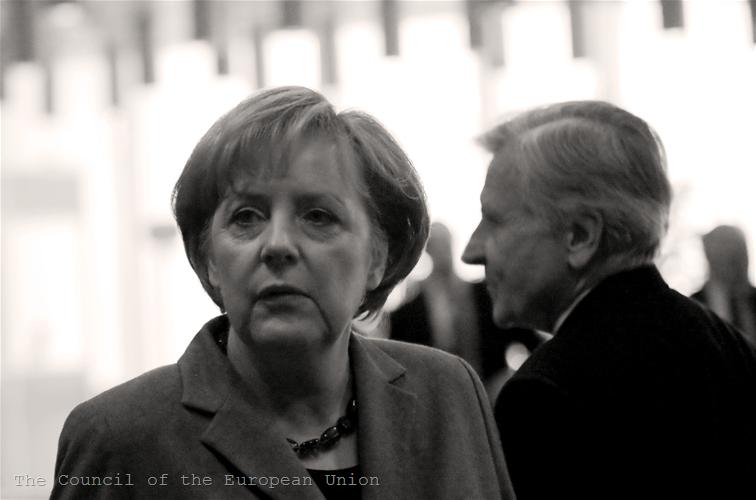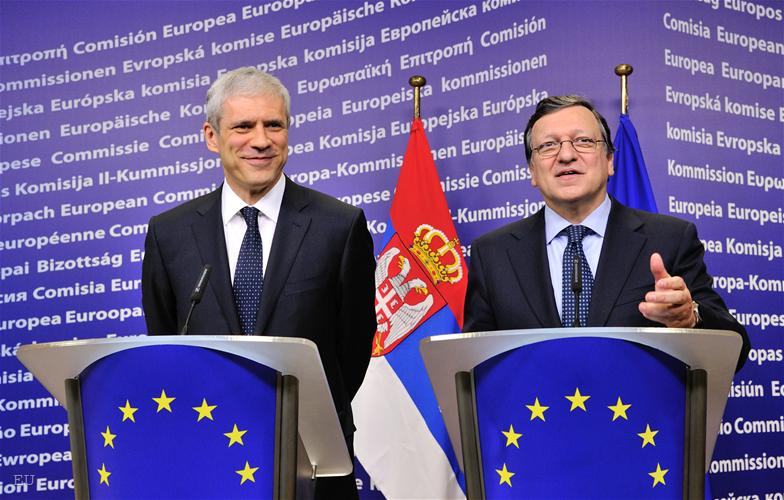And Why, Dammit, Aren't You Growing?
Adelina Marini, March 6, 2012
 On October 9th, 2010, The Economist came out with a very moving cover, roughly calling for economic growth: "Grow, dammit, grow!" It is time that such an appeal is conveyed to the EU, because the magazine's cover actually was the basis of a special 18-page report about the world economy situation, from which the EU is an indispensable part. On March 1-2 the EU leaders gathered for their Spring European Council in Brussels and for the first time ended their summit earlier than usual, without much of a drama and with 15-page long conclusions, in which the word "growth' is prevailing. After reading them, one cannot stop asking
On October 9th, 2010, The Economist came out with a very moving cover, roughly calling for economic growth: "Grow, dammit, grow!" It is time that such an appeal is conveyed to the EU, because the magazine's cover actually was the basis of a special 18-page report about the world economy situation, from which the EU is an indispensable part. On March 1-2 the EU leaders gathered for their Spring European Council in Brussels and for the first time ended their summit earlier than usual, without much of a drama and with 15-page long conclusions, in which the word "growth' is prevailing. After reading them, one cannot stop asking
Why, dammit, aren't you growing?
In fact, the path to these conclusions proved to be very funny if not quite painful. For almost 2 years the EU leaders lived on a summit to summit basis, swimming against the current of financial markets, credit rating agencies and deteriorating economic situation. The main measures, which the leaders, guided mainly by France and Germany, were drawing were related to constant public spending cuts, belt tightening, which in some countries was close to a shocking therapy. All this only to justify the money for helping the countries worst hit by the debt crisis and to protect the rest from contagion.
Some member states used to murmur quietly that it wouldn't work with austerity only, but most loud were representatives of the European Parliament, while the European Commission repeated without seize: "implementation, implementation, implementation" of already adopted initiatives, strategies, programmes and any other documents the main purpose of which is to boost economic growth.
When the murmuring and the shouts from Strasbourg became louder, in mid-January France and Germany came up with a joint letter on the eve of the first for 2012 informal European Council, in which they highlighted 6 measures to boost growth. The six are not new at all and thus far did not enjoy too much of implementation on national level. The January 30th summit ended with a wish for more measures on national level to fight unemployment, to complete the single market and to assist the small and medium sized enterprises. In general, Paris's and Berlin's visions were enshrined in the conclusions.
In the preparation process for the spring summit, at which it was planned the  outcome from the measures, adopted a year ago for economic policies coordination, budget discipline and austerity to be discussed, 12 member states wrote a letter to European Commission President Jose Manuel Barroso and to Herman Van Rompuy, European Council President. The letter, initiated by Britain, consists of 8 points, not 6, which are also not new. You will hardly be surprised but in the conclusions from the March 1-2 summit they can easily be recognised.
outcome from the measures, adopted a year ago for economic policies coordination, budget discipline and austerity to be discussed, 12 member states wrote a letter to European Commission President Jose Manuel Barroso and to Herman Van Rompuy, European Council President. The letter, initiated by Britain, consists of 8 points, not 6, which are also not new. You will hardly be surprised but in the conclusions from the March 1-2 summit they can easily be recognised.
The funny thing in all this is precisely that these measures are old, they were proposed by the European Commission long time ago, they were coordinated among the member states and can probably be found in one form or another in the conclusions of at least several EU summits. And then comes the logical question - why, dammit, aren't you growing? Nonetheless, these measures are being promoted by EU and national politicians with such a pathos as if a panacea of the crisis in Europe has just been discovered. British PM David Cameron started his national briefing after the summit precisely with this, by again succeeding to present the conclusions as national victory. Firstly, he recalled that this letter was written by 12 member states and that it was at the centre of the summit.
 "Together, the countries that signed this letter represent over half of the EU’s population – a quarter of a billion people. We made it clear that we should agree concrete steps at this meeting. Yesterday I was frustrated that the draft summit communiqué did not do this. But today [2 March] in Brussels, as you will see when the communiqué is published, we have made our voice heard. The communiqué has been fundamentally rewritten in line with our demands. There was in the original communiqué no mention of deepening the single market in services; now we have a clear commitment to take action in that area. There was nothing on tackling regulated professions and properly opening up this vital element of the single market; now we have a clear commitment to make progress on that specific area. [...]"
"Together, the countries that signed this letter represent over half of the EU’s population – a quarter of a billion people. We made it clear that we should agree concrete steps at this meeting. Yesterday I was frustrated that the draft summit communiqué did not do this. But today [2 March] in Brussels, as you will see when the communiqué is published, we have made our voice heard. The communiqué has been fundamentally rewritten in line with our demands. There was in the original communiqué no mention of deepening the single market in services; now we have a clear commitment to take action in that area. There was nothing on tackling regulated professions and properly opening up this vital element of the single market; now we have a clear commitment to make progress on that specific area. [...]"
What do the conclusions say?
Two days before the summit Commission President Jose Manuel Barroso responded with a detailed analysis of the letter of the Twelve, the article for which euinside titled "Barroso Responds: Why Don't You Implement?" We chose this title because in his answer Mr Barroso very well explains what has been done so far in terms of legislative initiatives and what has not been done by the member states. Outlined were the future steps of the Commission, again with a reminder that whatever is done in Brussels should be implemented in the 27 capital cities. Barroso was even slightly insulted by the fact that in the letter of the 12 member states not even once the 10-year EU economic strategy Europe 2020 was mentioned.
This is why the conclusions from the council on March 1-2 are a kind of merger of  all this talk from the past two months. On these 15 pages all the "demands" are included of the concerned sides - the Commission, the 12, France and Germany.
all this talk from the past two months. On these 15 pages all the "demands" are included of the concerned sides - the Commission, the 12, France and Germany.
For that reason, there is a kind of contradiction in the text. In the very beginning of the document, under point 1, it is written that the EU is undertaking all the necessary measures to get Europe back on the path of growth and employment. Then it is reaffirmed that Europe 2020 is the European strategy for growth and jobs, as the five main goals of the strategy are recalled, that have to be reached by 2020: 75% employment of the population between 20 and 64 years of age; 3% of European GDP to be invested in science and research; achieving the so called 20/20/20 goals on climate and energy; the share of early school leavers to be under 10% and at least 40% of the young people to have graduated secondary or tertiary education; 20 mn people less to be at risk of poverty.
Then in point 3 it is written that the undertaken efforts up to the moment remain insufficient for the implementation of these goals and this is why it is urgent to focus efforts on implementing the reforms, especially those that will have a short term effect on growth and jobs. The document affirms the Commission guidelines, outlined in the Annual Growth Survey 2012 (AGS2012), in which by the way it is emphasised on the fact that the member states do not implement. The Council takes note of the results of the first report on macroeconomic imbalances, promising to study the report more in detail later but by that time the Council invites the Commission to entirely, efficiently and quickly apply the procedure and the member states to act in compliance.
 In response to the letter, signed by the prime ministers of Britain, the Netherlands, Italy, Estonia, Latvia, Finland, Ireland, Czech Republic, Spain, Sweden, Poland, in the conclusions it is written:
In response to the letter, signed by the prime ministers of Britain, the Netherlands, Italy, Estonia, Latvia, Finland, Ireland, Czech Republic, Spain, Sweden, Poland, in the conclusions it is written:
- regarding the single market - that it is expected the Commission to propose in June a Communication on the single market and a report on the implementation of the services directive, as well as a report on sectoral implementation. In other words, the leaders fully endorse the programme the Commission has outlined in Barroso's response to the 12.
- on point 2 in the letter - completion of the digital single market by 2015, more specifically the adoption of measures, aimed at enhancing confidence in online trade, the leaders are awaiting the Commission proposals for the single standards of copyright;
- as regards reducing administrative and regulatory burden in the EU and nationally, the Council welcomes the Commission's intention to propose a communication on the issue;
- the leaders are satisfied with the new Commission report on trade and investment barriers and in June they will review progress and will also discuss how the Union can deepen its trade and investment relations with its key partners.
What is interesting in the otherwise not very attractive document from the end of the summit is the European Council recommendation for enhanced "peer pressure" that is aimed to force the heads of state and government to stick to their commitments for the development of the single market. The leaders also invite the Commission to produce transparent comparative scoreboard of implementation of the member states and the president of the European Council is invited to regularly monitor progress on the main proposals related to the single market.
Before the beginning of the spring summit, during and after it the main message EU and national leaders was that the EU is returning to the business-as-usual mode, that it is no longer in a crisis mode and that from now on what lies ahead is a long, fragile but still a recovery. The spirit of the conclusions express precisely this and this is why it is necessary to regularly repeat: "Grow, dammit, grow!"
 | © The Council of the European Union
| © The Council of the European Union | © The Council of the European Union
| © The Council of the European Union | © EU
| © EU